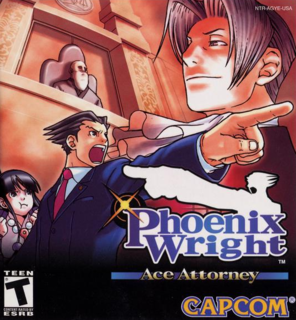A good game that could've been really great gets bogged down by frustrations and finickyness the further you progress.
You set off the game as the title character, an amazing lawyer mentored by an even more amazing lawyer (and similar to JRPGs, their ages are shockingly young). Starting off with a tutorial case that introduces you to the legal world of the game, you learn the ins and outs of collecting evidence for your clients and then using it to catch lying witnesses by presenting appropriate items when their statements contradict the facts. You also get to deal with your prosecutorial adversary, Miles Edgeworth, who's equally unbelievably young and who's dealt with rumors of falsifying evidence and dirty play his whole career. As you progress through the game, the cases become longer, with more evidence, witnesses, and 'Law & Order' twists than you can shake a stick at. At the end, there's a DS-only case (the game is mostly a port of a GBA game that never had a U.S. release) utilizing the system's functionality a bit more.
The game's biggest coup is the way it brings out character traits and quirks with no voicework. Emotions and (often ulterior) motives are smartly brought out via animations, some light sound effects, and clever dialogue. The unique setting is also a plus, as the courtroom is not a typical setting for a videogame, so 'legal eagles' will find fun here, especially getting to use the microphone to yell, "Objection!!" Luckily, even those without a keen legal sense are helped by the fact that the game won't let you progress to trial without all the evidence you need for the next day's proceedings, so you don't have to worry about outright blowing a case by being unprepared. The DS-only case shines in the evidence-collecting department, as you get to use Luminol to find blood splatter and fingerprint dust to lift prints, and getting to blow into the microphone to blow away the excess dust is a great touch.
Sadly, the game has many shortfalls that seem to multiply and become more pervasive the further you get into the game. Too often you're required to take ridiculous leaps in logic to tie evidence to a witness statement. Even worse are times when there are multiple items that one could logically use to point out an inconsistency, but the game only deems one to be 'correct.' It's even worse when you just know that the other evidence items you thought of will be used later to point out nearly the exact same truth with a near-similar statement, and then be proved right. Worse still, this issue grows as cases get more complex and have more evidence. Some legal inconsistencies range from benign (trials only can last 3 days) to laugh-out-loud stupid (anyone who's seen "My Cousin Vinny" knows the prosecution has to give you its evidence, but here it's a closely-guarded secret to be kept from you if at all possible). While the fact that they tried to give the game a backstory tying many characters together can be appreciated, it just serves to be needless dialogue with no real bearing on the main gameplay. There's enough advancing through text with the stylus as it is. Another minor downfall is that it's almost always frighteningly obvious who committed the crimes the second you meet them, so there's rarely a surprise.
While from a purely functional standpoint, everything works well (the game can be played entirely with the stylus), the illogical way you're required to use evidence in court hampers the flow of the game and just frustrates you. What graphics there are typically are just static, but are very well-crafted to give you a lot of subtle information from a simple 2D view. There's very little sound, and what there is merely falls in the good category, as even the cell phone beep could've been better. You can get over 20 hours out of the game, but some of that sadly is needlessly tedious text reading that gets a bit irritating when things are repeated in different language. In the end we're left with a game that ambitiously tries to turn the courtroom into a viable videogame, and while it succeeds on many levels, if the sequel allows for multiple pieces of evidence to be 'correct' in pointing out inconsistencies, when multiple pieces are, in fact, correct, it will be a vast improvement and more worthy of your purchase.

